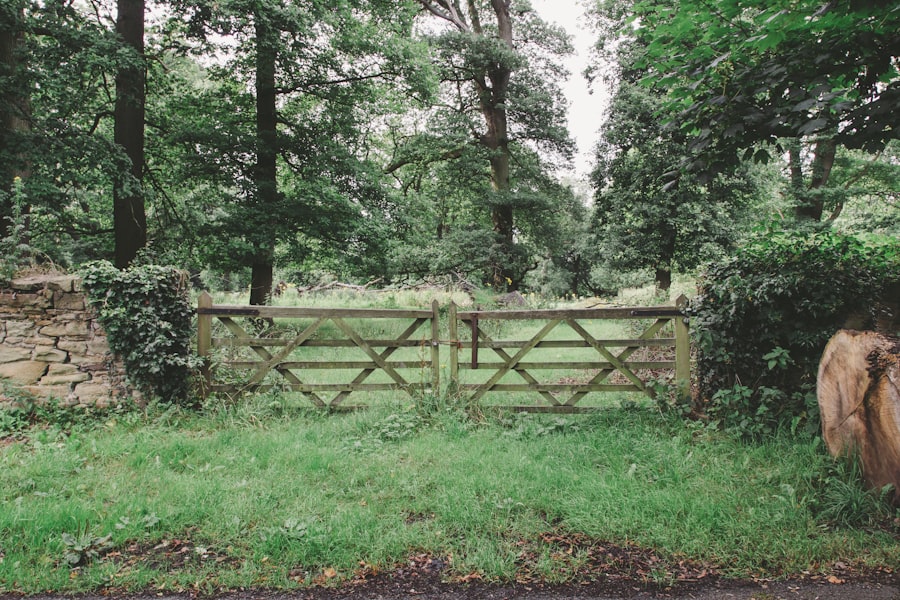You may have heard the term “sleep gate” before, but what does it really mean? The sleep gate refers to the threshold your body must cross to enter a state of restorative sleep. It’s not just about falling asleep; it’s about transitioning into deeper stages of sleep that are crucial for physical and mental recovery.
This concept encompasses various factors, including your body’s natural circadian rhythms, environmental influences, and psychological readiness. Understanding this gate is essential for anyone looking to improve their sleep quality. As you delve deeper into the concept of the sleep gate, you might realize that it is not a singular event but rather a complex interplay of biological and environmental factors.
Your body has its own internal clock, known as the circadian rhythm, which regulates sleep-wake cycles. This rhythm is influenced by external cues like light and temperature, as well as internal factors such as hormone levels. Recognizing how these elements interact can empower you to take control of your sleep patterns and unlock the potential for more restorative rest.
Key Takeaways
- The sleep gate is the body’s natural mechanism for regulating sleep and wake cycles, influenced by factors such as light, temperature, and melatonin levels.
- Understanding the science behind better rest involves recognizing the role of circadian rhythms, sleep stages, and the impact of sleep deprivation on overall health.
- The sleep gate affects sleep patterns by determining the body’s readiness for sleep and influencing the quality and duration of rest.
- Tips for unlocking the sleep gate include establishing a consistent bedtime routine, managing stress, and creating a comfortable sleep environment.
- Creating the ideal sleep environment involves controlling factors such as light, noise, and temperature to promote better sleep quality and duration.
The Science Behind Better Rest
The science of sleep is a fascinating field that has garnered significant attention in recent years. Sleep is not merely a passive state; it is an active process that plays a vital role in your overall health.
For instance, REM sleep is crucial for cognitive functions such as memory consolidation and emotional regulation, while non-REM sleep is essential for physical recovery and growth. Understanding these stages can help you appreciate why quality sleep is so important. When you achieve a full cycle of sleep, which typically lasts about 90 minutes, you allow your body to repair itself and your mind to process the day’s events.
This cycle repeats several times throughout the night, making it essential to create conditions that facilitate uninterrupted sleep. By grasping the science behind these processes, you can better appreciate the importance of unlocking your sleep gate.
How the Sleep Gate Affects Your Sleep Patterns

Your sleep patterns are intricately linked to how effectively you can navigate your sleep gate. If you find yourself tossing and turning at night or waking up feeling groggy, it may be a sign that you are struggling to pass through this gate. Factors such as stress, anxiety, and even diet can create barriers that prevent you from achieving restful sleep.
When these obstacles arise, they can disrupt your natural sleep cycles, leading to fragmented rest and diminished overall well-being. Moreover, understanding how the sleep gate affects your patterns can help you identify specific triggers that may be hindering your ability to fall asleep or stay asleep. For example, if you often find yourself awake at 3 AM with racing thoughts, it may indicate that your mind is not ready to transition into deeper stages of sleep.
By recognizing these patterns, you can take proactive steps to address them and create a more conducive environment for restful slumber.
Tips for Unlocking the Sleep Gate
| Tip | Description |
|---|---|
| Establish a bedtime routine | Creating a consistent bedtime routine can signal to your body that it’s time to wind down and prepare for sleep. |
| Avoid caffeine and electronics before bed | Limiting caffeine and screen time before bed can help your body relax and prepare for sleep. |
| Create a comfortable sleep environment | Ensure your bedroom is conducive to sleep by keeping it dark, quiet, and at a comfortable temperature. |
| Manage stress and anxiety | Practicing relaxation techniques or mindfulness can help reduce stress and anxiety that may interfere with sleep. |
| Limit naps during the day | While napping can be beneficial, excessive napping during the day can disrupt your nighttime sleep. |
Unlocking the sleep gate requires a multifaceted approach that addresses both physical and psychological aspects of sleep. One effective strategy is to establish a consistent bedtime routine that signals to your body that it’s time to wind down. This could include activities such as reading a book, practicing gentle yoga, or engaging in deep-breathing exercises.
By creating a calming pre-sleep ritual, you can help your mind and body transition more smoothly into a state of rest. Another important tip is to limit exposure to screens before bedtime. The blue light emitted by phones, tablets, and computers can interfere with your body’s production of melatonin, the hormone responsible for regulating sleep.
Aim to turn off electronic devices at least an hour before bed to give your body the chance to prepare for sleep naturally. By implementing these strategies, you can begin to unlock your sleep gate and enjoy more restorative nights.
Creating the Ideal Sleep Environment
Your sleep environment plays a crucial role in determining how easily you can pass through the sleep gate. Ideally, your bedroom should be a sanctuary designed for relaxation and restfulness. Start by ensuring that your sleeping space is dark, quiet, and cool—conditions that are conducive to better sleep.
Consider investing in blackout curtains or a white noise machine if external light or sounds disrupt your slumber. Additionally, pay attention to your bedding and mattress quality. A comfortable mattress and supportive pillows can make a significant difference in how well you sleep.
You might also want to explore different types of bedding materials to find what feels best for you. By creating an ideal sleep environment tailored to your preferences, you can enhance your chances of unlocking the sleep gate each night.
The Role of Nutrition in Opening the Sleep Gate

What you eat can significantly impact your ability to unlock the sleep gate. Certain foods contain nutrients that promote better sleep quality, while others may hinder it. For instance, foods rich in magnesium—such as leafy greens, nuts, and seeds—can help relax muscles and calm the nervous system, making it easier for you to drift off into slumber.
On the other hand, heavy meals or caffeine close to bedtime can disrupt your ability to fall asleep. Incorporating foods that promote better sleep into your evening routine can be a game-changer. Consider having a small snack that includes complex carbohydrates and protein before bed; this combination can help stabilize blood sugar levels throughout the night.
By being mindful of your nutritional choices, you can create an internal environment that supports unlocking the sleep gate.
The Importance of Consistent Bedtime Routines
Establishing a consistent bedtime routine is one of the most effective ways to signal to your body that it’s time for rest. When you go to bed at the same time each night and wake up at the same time each morning, you help regulate your circadian rhythm. This consistency reinforces your body’s natural sleep-wake cycle and makes it easier for you to fall asleep and wake up feeling refreshed.
Incorporating relaxing activities into your routine can further enhance its effectiveness. Whether it’s taking a warm bath, practicing meditation, or journaling about your day, these calming practices can help ease your mind and prepare you for restful slumber. By prioritizing consistency in your bedtime routine, you’ll find it easier to unlock the sleep gate night after night.
Technology and Its Impact on the Sleep Gate
In today’s digital age, technology plays a significant role in our lives—and it can have both positive and negative effects on our ability to unlock the sleep gate. While technology offers tools like sleep-tracking apps and guided meditation programs that can enhance your sleep experience, it also presents challenges such as screen time before bed and constant notifications that disrupt relaxation. To mitigate these negative impacts, consider setting boundaries around technology use in the evening hours.
Designate specific times when devices are turned off or put away to create a more peaceful atmosphere conducive to winding down. By being intentional about how you engage with technology in relation to your sleep habits, you can harness its benefits while minimizing its drawbacks.
Overcoming Sleep Gate Obstacles
You may encounter various obstacles on your journey toward unlocking the sleep gate—stressful life events, anxiety about work or personal matters, or even physical discomfort from an unsupportive mattress. Recognizing these barriers is the first step toward overcoming them. Once identified, you can implement strategies tailored to address each specific challenge.
For instance, if stress is keeping you awake at night, consider incorporating relaxation techniques such as deep breathing or progressive muscle relaxation into your bedtime routine. If physical discomfort is an issue, investing in quality bedding or adjusting your sleeping position may provide relief. By actively working to overcome these obstacles, you’ll find it easier to navigate through the sleep gate and enjoy more restorative nights.
The Connection Between Exercise and the Sleep Gate
Regular physical activity has been shown to have a profound impact on sleep quality and overall well-being. Engaging in exercise helps regulate hormones associated with stress and promotes feelings of relaxation—both of which are essential for unlocking the sleep gate. Whether it’s a brisk walk during lunch or an evening yoga session, finding ways to incorporate movement into your daily routine can significantly enhance your ability to fall asleep.
However, timing matters when it comes to exercise and its effects on sleep. While morning or early afternoon workouts can energize you throughout the day and promote better nighttime rest, exercising too close to bedtime may have the opposite effect by raising adrenaline levels and making it harder for you to wind down. By being mindful of when you exercise, you can optimize its benefits for unlocking the sleep gate.
Embracing Mindfulness and Relaxation Techniques for Better Sleep
Mindfulness practices have gained popularity as effective tools for improving sleep quality by helping individuals manage stress and anxiety levels. Techniques such as meditation, deep breathing exercises, or gentle stretching can create a sense of calm that prepares both mind and body for restful slumber. By incorporating mindfulness into your nightly routine, you may find it easier to let go of racing thoughts and embrace relaxation.
Additionally, consider exploring guided meditation apps or online resources specifically designed for promoting better sleep. These tools often provide soothing narratives or calming sounds that can help ease you into a state of tranquility before bed. By embracing mindfulness and relaxation techniques as part of your approach to unlocking the sleep gate, you’ll cultivate an environment where restful nights become more attainable.
In conclusion, unlocking the sleep gate involves understanding its complexities and implementing strategies tailored to your unique needs. From creating an ideal sleep environment to embracing mindfulness practices, each step contributes toward achieving better rest and overall well-being. As you embark on this journey toward improved sleep quality, remember that consistency is key; with time and dedication, you’ll find yourself crossing through that gate with ease.
In the wake of the Sleep Gate controversy, which has sparked widespread discussions about the impact of sleep deprivation on mental health, a related article on Unplugged Psych delves into the psychological effects of inadequate rest.
By examining the latest research and expert opinions, the article provides valuable guidance on improving sleep hygiene and prioritizing rest as a crucial component of overall well-being.
WATCH THIS! Is This Hidden ADHD Sign Quietly Wrecking Your Sleep and Draining Your Energy?
FAQs
What is Sleep Gate?
Sleep Gate is a term used to describe the process of transitioning from wakefulness to sleep. It refers to the period of time when the body and mind are preparing for sleep.
What are the stages of Sleep Gate?
The stages of Sleep Gate include relaxation, decreased heart rate and breathing, and a shift in brain wave activity. This process allows the body to enter into the various stages of sleep, including light sleep, deep sleep, and REM sleep.
How long does Sleep Gate typically last?
Sleep Gate typically lasts for about 10 to 20 minutes, although this can vary from person to person. It is a natural part of the sleep cycle and is essential for achieving restful and rejuvenating sleep.
What are some tips for improving Sleep Gate?
Some tips for improving Sleep Gate include establishing a regular sleep schedule, creating a relaxing bedtime routine, avoiding stimulants like caffeine and electronics before bed, and creating a comfortable sleep environment.
Why is Sleep Gate important?
Sleep Gate is important because it allows the body and mind to transition smoothly into sleep, which is essential for overall health and well-being. It is during this time that the body repairs and rejuvenates itself, and the brain processes and consolidates memories.




